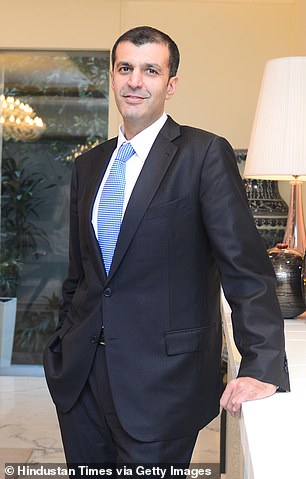- Neeraj Kanwar is boss of Apollo Tyres
- Company has seven factories across the world – but none in the UK
- Employment expert brands Kanwar’s remarks as ‘crude national stereotyping’

Stereotyping: Neeraj Kanwar is managing director of Indian firm Apollo Tyres
The boss of a multinational tyre-making giant said he would not build a factory in the UK because British workers ‘hardly work – they go to the pub’.
London-based Neeraj Kanwar is managing director of Indian firm Apollo Tyres, which has seven factories across the world – including a European base in Hungary – but none in the UK.
Kanwar, 52, who also owns an Italian restaurant in London called Scalini, blamed the welfare state for making it less important for people to have to hold down jobs. But an employment expert branded Kanwar’s remarks as ‘crude national stereotyping’.
Apollo, which enjoyed revenues of £2.3billion in the latest financial year to the end of March 2023, employs more than 18,000 staff globally and is a long-term sponsor of Manchester United.
In the UK, the company has a ‘thin’ team of around 30 working on its corporate brand, finance and some HR operations. It also has one of two innovation hubs in the UK – with the other in Hyderabad in India – and has a tie-up with Glasgow University, working in areas such as artificial intelligence to boost productivity at its factories.
But Kanwar dismissed the idea of manufacturing in the UK given the scarcity of workers.
‘There’s no incentive to go into the UK,’ he said.
‘Hungary gave us incentives, the cost of labour is much more competitive and then the cost of production becomes much more easy. And you know how the workforce in the UK is. They hardly work – they go to the pub.’
Kanwar said the remark was a quip but added: ‘I think because of government policies people can sit home and get pensions and they don’t need to work, and that’s a big policy issue.’
Apollo was founded in the 1970s by Kanwar’s grandfather Raunaq Singh. Kanwar’s London base is also a ‘semi-HQ’ for Apollo’s global operations outside India. The remarks come as London faces a battle to re-establish itself as a hub for international business chiefs, many of whom have chosen to base themselves in the UK or list their businesses here even when their main operations are overseas.
Kanwar’s views were criticised by labour market economist John Philpott. He said: ‘This strikes me as crude national stereotyping that would be condemned if made by a British employer about workers overseas.
‘Workers in all developed countries tend to get more choosy about job choices as income levels and education improves, which is one reason why migrant labour is used to fill lower paid roles.
‘But there is little evidence to suggest that able-bodied people with few other options can reject jobs because of the availability of benefits. Indeed, one can see from the fact that so many young educated British people end up in less skilled and insecure work in the so-called gig economy that an easy life on benefits spent down the pub is not a widespread preference.’









